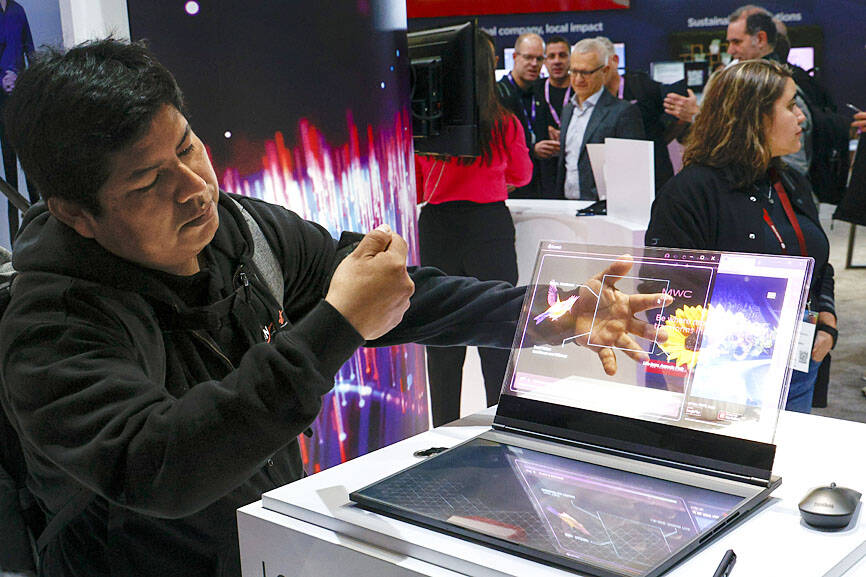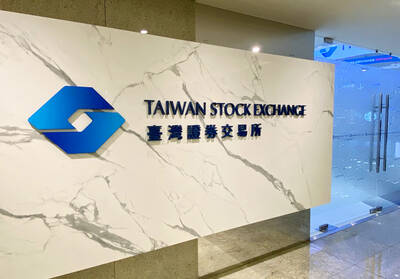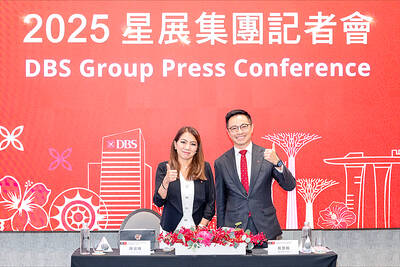Lenovo Group Ltd (聯想), the world’s largest PC maker, laid off 92 employees in Taiwan earlier this month, amid weak demand in the global market, the Ministry of Labor said.
Lenovo Global Technology (Taiwan) Ltd submitted a plan to the ministry on March 1, saying that the company intended to lay off 12 workers on March 4 and another 80 on March 20, Ministry of Labor section chief Chin Shih-ping (金士平), who arbitrates labor disputes in the local market, said on Thursday.
The layoffs were due to a decline in business, Chin said.

Photo: EPA-EFE
Lenovo’s plan came to light earlier in the day, when local media reported that the company had cut its workforce in Taiwan by about 100, amid a drop in global orders.
Lenovo Global Technology (Taiwan), one of the China-based parent company’s two subsidiaries in Taiwan, is a computer and peripherals maker, which has 901 employees registered in the national labor insurance system, he said.
The other subsidiary is Lenovo Technology B.V. Taiwan Branch (Netherlands), a computer and peripherals retailer which has 106 workers registered in Taiwan’s labor insurance system, he added.
That subsidiary has not given any indication to the ministry that it plans to lay off workers.
Lenovo Taiwan had been compiling its layoff list since last month, with a plan to slash about 80 percent or more of its workforce in some divisions, local media reports said.
The company’s management and workers reached an agreement prior to the layoffs this month, Chin said on Thursday, but added that if any of the employees were forced to leave, he advises them to file a complaint with local government labor authorities to seek redress.

Taiwan Semiconductor Manufacturing Co (TSMC, 台積電) secured a record 70.2 percent share of the global foundry business in the second quarter, up from 67.6 percent the previous quarter, and continued widening its lead over second-placed Samsung Electronics Co, TrendForce Corp (集邦科技) said on Monday. TSMC posted US$30.24 billion in sales in the April-to-June period, up 18.5 percent from the previous quarter, driven by major smartphone customers entering their ramp-up cycle and robust demand for artificial intelligence chips, laptops and PCs, which boosted wafer shipments and average selling prices, TrendForce said in a report. Samsung’s sales also grew in the second quarter, up

LIMITED IMPACT: Investor confidence was likely sustained by its relatively small exposure to the Chinese market, as only less advanced chips are made in Nanjing Taiwan Semiconductor Manufacturing Co (TSMC, 台積電) saw its stock price close steady yesterday in a sign that the loss of the validated end user (VEU) status for its Nanjing, China, fab should have a mild impact on the world’s biggest contract chipmaker financially and technologically. Media reports about the waiver loss sent TSMC down 1.29 percent during the early trading session yesterday, but the stock soon regained strength and ended at NT$1,160, unchanged from Tuesday. Investors’ confidence in TSMC was likely built on its relatively small exposure to the Chinese market, as Chinese customers contributed about 9 percent to TSMC’s revenue last

Taiwan and Japan will kick off a series of cross border listings of exchange-traded funds (ETFs) this month, a milestone for the internationalization of the local ETF market, the Taiwan Stock Exchange (TWSE) said Wednesday. In a statement, the TWSE said the cross border ETF listings between Taiwan and Japan are expected to boost the local capital market’s visibility internationally and serve as a key for Taiwan becoming an asset management hub in the region. An ETF, a pooled investment security that is traded like an individual stock, can be tracked from the price of a single stock to a large and

Despite global geopolitical uncertainties and macroeconomic volatility, DBS Bank Taiwan (星展台灣) yesterday reported that its first-half revenue rose 10 percent year-on-year to a record NT$16.5 billion (US$537.8 million), while net profit surged 65 percent to an unprecedented NT$4.4 billion. The nation’s largest foreign bank made the announcement on the second anniversary of its integration with Citibank Taiwan Ltd’s (花旗台灣) consumer banking business. “Taiwan is a key market for DBS. Over the years, we have consistently demonstrated our commitment to deepening our presence in Taiwan, not only via continued investment to support franchise growth, but also through a series of bolt-on acquisitions,” DBS